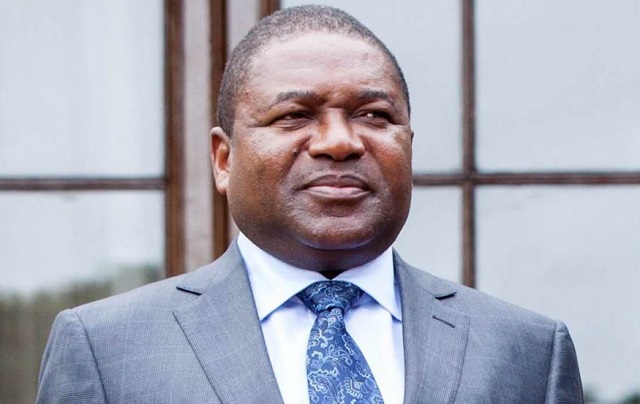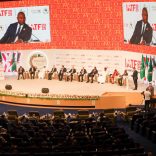Chapo calls on African countries to work together towards human development
Subsidies were unsustainable – Nyusi

TVM (File photo) / President of Mozambique Filipe Jacinto Nyusi
Mozambican President Filipe Nyusi on Monday defended the withdrawal of subsidies on such goods as fuel and wheat flour, arguing that the economic situation of the country made this move imperative.
Speaking at a meeting with the Mozambican community resident in Botswana, Nyusi said “for years and years we were handing out impossible subsidies, and later it would just not be sustainable. Where would the money come from?”
He added that it required great courage on the part of the government to take these measures, and Mozambicans should understand why it did so, because otherwise, sooner or later, the Mozambican economy would have collapsed.
Nyusi pointed out that foreign aid had begun to shrink as from 2015, when some of the country’s cooperation partners started to reduce their support. The situation became much worse in 2016, when the government found it had to work only with domestic resources.
This was because the International Monetary Fund (IMF) suspended its programme with Mozambique, and most other western partners followed suit. All 14 donors who used to provide direct support to the state budget suspended further disbursements as from April 2016. They were reacting to the discovery that the previous government, headed by President Armando Guebuza, had illicitly issued guarantees for over two billion dollars worth of loans from European banks to the security-related companies Ematum, Proindicus and MAM.
As part of its strategy to overcome the situation, the government felt obliged to reduce or eliminate subsidies, and raise the prices of goods such as fuel and electricity.
The fuel subsidy was generalized and meant that the price at the pumps was far lower than the international price which the fuel companies had paid when importing petrol and diesel. The government promised to compensate the companies for this difference, but was late in paying the subsidy – leading fuel companies to warn that the whole fuel import and distribution system might collapse.
Less damaging was the subsidy paid to bakers for the wheat flour used to make bread. The government withdrew the subsidy on 1 April, but this was not followed by any general increase in bread prices. Nyusi pointed out that far from all the bakeries had benefitted from the subsidy – in Beira and Nampula less than ten per cent were receiving the subsidy.
Nyusi assured his audience that the government intends to maintain the sustainability of the Mozambican state and to guarantee that basic goods are accessible to everyone.
To overcome the current economic difficulties, and to reduce the impact of the reduction in foreign aid, Nyusi recommended efforts to increase production and productivity. “We must get out of our dependence, by creating partnerships to explore possible investment but above all by working”, he said.
Nyusi also took advantage of the meeting to express his conviction that very soon an agreement will be reached between the government and the leader of the Renamo rebels, Afonso Dhlakama, to re-establish effective peace in Mozambique.
“I am hopeful that, at any moment, things can change”, said Nyusi. “What is important is trust in what we are building between Mozambicans”.
“Trust is very important”, the President stressed. “When people have trust – or rather when they don’t distrust – then they believe in what the others are saying”.
When that happens, “it’s easy to attain consensus”, he added.












Leave a Reply
Be the First to Comment!
You must be logged in to post a comment.
You must be logged in to post a comment.